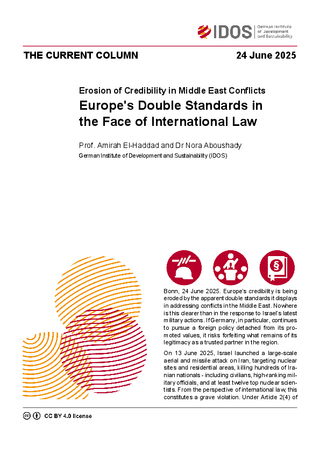Erosion of Credibility in Middle East Conflicts
Europe's Double Standards in the Face of International Law
El-Haddad, Amirah / Aboushady, NoraThe Current Column (2025)
Bonn: German Institute of Development and Sustainability (IDOS), The Current Column of 24 June 2025
Bonn, 24 June 2025. Europe’s credibility is being eroded by the apparent double standards it displays in addressing conflicts in the Middle East. Nowhere is this clearer than in the response to Israel’s latest military actions. If Germany, in particular, continues to pursue a foreign policy detached from its promoted values, it risks forfeiting what remains of its legitimacy as a trusted partner in the region.
On 13 June 2025, Israel launched a large-scale aerial and missile attack on Iran, targeting nuclear sites and residential areas, killing hundreds of Iranian nationals - including civilians, high-ranking military officials, and at least twelve top nuclear scientists. From the perspective of international law, this constitutes a grave violation. Under Article 2(4) of the UN Charter, the use of force against the territorial integrity or political independence of another sovereign state is strictly prohibited, unless sanctioned by a Security Council resolution or undertaken in legitimate self-defense following an armed attack. Israel’s unilateral strike - without UN authorisation, a Security Council resolution, without even an international coalition, or imminent provocation - clearly falls outside the bounds of legality.
Iran has indeed been found in non-compliance with its safeguards and obligations under the Nuclear Non-Proliferation Treaty (NPT). Yet, such infractions are addressed through the International Atomic Energy Agency (IAEA) and the UN Security Council - mechanisms established to manage such complex issues. Israel, notably, is not a party to the NPT and maintains a long-standing policy of deliberate ambiguity concerning its own nuclear arsenal. Unlike other non-signatories such as India and Pakistan, Israel has never openly acknowledged its nuclear capabilities. This raises a fundamental question: what grants Israel the authority to act as the enforcer of a treaty to which it does not even adhere?
If the justification is rooted in a perceived existential threat, one must ask: why is it legitimate for Israel to invoke this fear while disregarding similar anxieties of its neighbours? Many Arab states perceive Israel’s unacknowledged nuclear arsenal as a direct threat to regional stability. By the same logic, are they too entitled to launch unilateral military action against Israel’s nuclear infrastructure and scientists?
Equally troubling is the response from part of the democratic West. While Western leaders frequently invoke rule of law and democratic values in Global South conflicts, their endorsement of Israel’s actions stands in sharp contrast. Rather than condemning the attack, leaders from Germany, France, and the United Kingdom, alongside European Commission President Ursula von der Leyen, reiterated their support for Israel’s "right to self-defense." Such framing, rightfully applied in condemning Russia’s invasion of Ukraine, is conspicuously absent regarding Israel’s actions. Both are acts of aggression. Condemning both is crucial to uphold justice and reject double moral.
The invocation of self-defense in this context is problematic. Over the past two years, Israel has carried out extensive military operations across the region - from the devastation of Gaza to airstrikes in Lebanon, Syria and Yemen - often under ambiguous or unverified justifications. These actions resulted in severe humanitarian consequences. In Gaza alone, UNICEF estimates over 50,000 children killed since October 2023. Independent investigations and Amnesty International have concluded that Israel’s actions amount to crimes against humanity and genocide.
The scale of destruction is staggering: By April 2024, Israel had dropped over 70,000 tons of bombs on the Gaza Strip - more than the total bomb load used during World War II in the air raids on Dresden and Hamburg by the Allies, and on London by the German Luftwaffe. The environmental and human toll, some experts suggest, is equivalent to detonating two nuclear bombs in carbon emissions. Under these circumstances, one may ask: who truly has the right to feel threatened? Neighbouring countries such as Egypt and Jordan expressed serious concern that they may be targeted next, particularly as they resist political pressure from the United States and Israel to absorb Palestinian populations - effectively undermining the Palestinian right to a two-state solution.
These developments raise critical questions about Germany’s role in the region. Foremost, rather than affirming violations of international law, Germany should end arms sales that fuel ongoing wars. At the same time, it should intensify diplomatic efforts - not merely to demonstrate engagement, but to actively work toward achieving a political solution and lasting peace. Only then can it create the conditions necessary to advance its ambitious sustainable development cooperation objectives in the Middle East.



